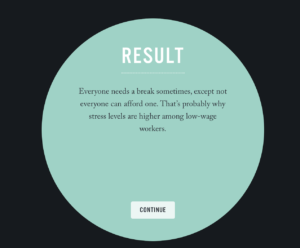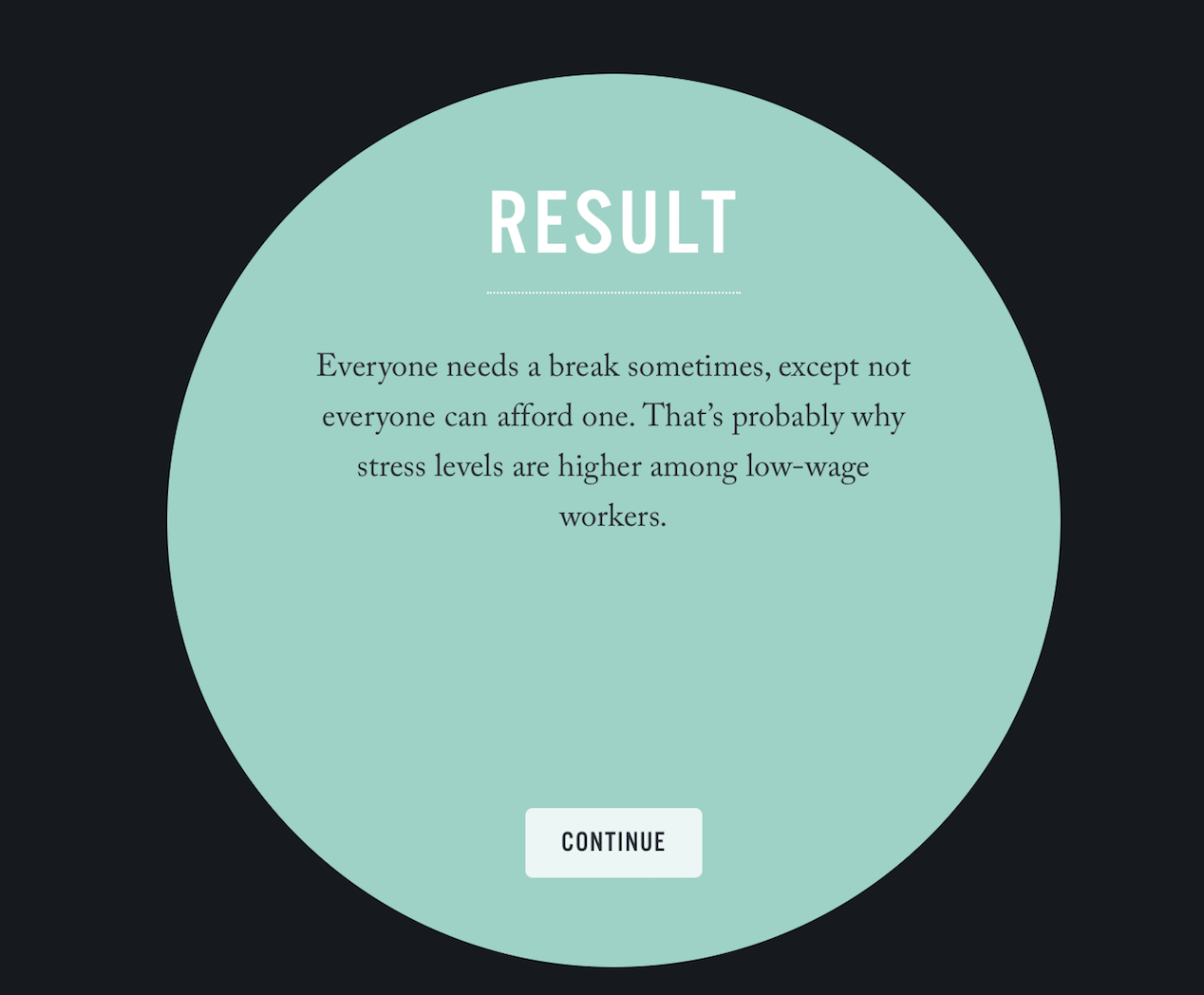This week when I was playing the serious game Spent, I got this feeling of unsatisfaction but did not clearly know what was wrong with this game. After our discussion this past Thursday, I started to see some serious problems that made this game not serious enough, and I want to expand on our discussion during class here as I believe these pitfalls that Spent had can potentially be ignored by other game design as well.

One thing that we discussed during the class is that Spent’s game mechanics give people an illusion as if one is fully responsible for one’s financial situation and the problems low-income families face are totally controllable if the right choices are made. Here, even though Spent introduces new challenges to players every day, it is up to the players to decide on whether to spend the money or not, and every of their decisions changes the amount of saving on the avatar’s account and determines if the family will be able to pull through. This game mechanic gives players agency and allows them to decide on the destiny of the avatar’s family, making it as if it is the players’ decisions that determine the outcome of the avatar’s financial situations. In other words, Spent oversimplifies the real social problem due to the system and makes the players believe that poverty is something controllable as long as the player makes the right choices and manages money properly. Another serious game, We Are Chicago, that we played this week also shares the same problem, though it is said that the design team has carefully studied Spent before actually making We Are Chicago. Another blog post from this week “We are Chicago” and Chicago’s Legacy critically touches on this issue, and I highly recommend everyone to read that blog: the author argues that We Are Chicago leaves players with the impression that there is a way for the avatar to make his way through as long as he chooses to be a good resident and do the right thing. It focuses too much on individual level experience and failed to critically discuss the structural problems and unequal resource displacement that cause all the violence in Chicago from the first place.
In the meantime, Spent gives the players a lot of backup options to maximize their probability to win the game. On the lower left-hand side of the screen, players are offered three options to earn money if they run it out in the middle of the month—avatar can smash the kid’s piggy bank, donate plasma, or get a payday loan. It is not hard to see that the game really wants the player to win—it poses challenges while also makes every effort to make the process less difficult. As a result, players are very likely to be left with the impression that it is not so hard to earn a living: if they can make it on the first try, others should also be capable of solving the problems in real world scenarios, and those who fail to get out of their financial struggle must have problems within themselves. The affluent backup options players have possibly form them a subjective impression on the real dilemma low-income families face.

Another problem with Spent is, this game only creates unexpected situations that show the challenges low-income families face on their daily basis without carefully exploring deeper reasons behind their unpleasant financial situations. In this game, players constantly have to deal with unexpected situations that cost money and increase stress, such as experiencing a sudden heart problem, kids accidentally breaking the window, etc. Players are forced to keep close attention to the changing number in their saving and adapt to new strategies to manage their money every day. Players get to take up whatever is set up for them and experience pressure from outside ever since the moment they start the game, while the game does not tell them any back stories: why does the avatar only have such a small amount of saving? Why are these low-payment jobs the avatar’s only options to earn a living? These barely addressed questions in this game can potentially lead to more fundamental discussions critical to solving the problem on a structural level, while this game chooses to gather people’s attention to the phenomenon, to have players understand low-income families on a superficial level. This lack of more profound understanding to the situation fails to generate empathy within the players and unsuccessfully promote more meaningful changes other than asking people to donate money.

Even though Spent failed people’s expectation in many aspects, there is still some good design that is worth giving it a shoutout. For example, the biggest surprise I had with this game is that there is explanation window popping up almost every time after the player makes certain decisions. These explanations successfully connect this game play choice to real-world situations. One thing that gave me the aha-moment was a window that explains why low-income families tend to be less involved in their children’s education. Unlike my previous assumption (they do not acknowledge the significance of education), many parents had to quit because they needed to use the time to work and earn money. These explanation windows allowed me to see the real reasons that I otherwise will not think of.
In a nutshell, Spent fails to truly address the fundamental problems low-income families face. It also shows the huge amount of effort and careful thought that need to be put into a serious game design if it intends to generate serious discussions over real-world problems.


I agree with all of this! When I first played it, I was like oh, okay, so a game about how it’s impossible to keep up in such a world we live in? Too close to home! But I guess I was expecting…More? It felt almost a little tasteless when it came to a lot of the in-game events, especially without the context that many players from more well-off families/lives might have, and I think that there is a degree of understanding of the game that only those who have lived it are able to feel on such a deep level, and yet those same people are the ones who the game is not exactly for because like… Why would I need to know life is hard if I already have lived through this and continue to… I don’t know haha, but awesome points! I feel like with some tweaking this game could work more on a game design level, but also there’s the sad reality that it’s truly impossible to get those who haven’t lived this life to actually experience what is happening in this game withiut the deep dread and terror that comes with it.
I also agree with all your points! And I also felt that the most powerful moment of the game was the aha-moment of why low-income families might be less involved with their children’s education. Another big reason why I felt the game was unsuccessful was the abundance of numbers and the game’s aesthetic choices & UI/UX design. I read an article that humans are not very capable of processing numbers, especially numbers. So I don’t think having all those numbers and data were a good idea of raising people’s empathy. Also, the design was a little bit too clean in my opinion. I think it would have been better if the game provided realistic graphics or visuals that help the player to feel immersed into the life of a low-income person. Instead, the game made all these icons on the sidebar which looked aesthetic but did not evoke any emotions. The interface design was really clean and modern looking, but I think it was the very reason why players didn’t feel as emotional and empathetic as the game wanted them to be.
Great points! It’s interesting how even though games can deliver powerful messages via their systemic nature but in this case fails actually to shed full light onto a systemic problem. I guess some concrete improvements that could be made, building on your points, is to make it apparent how a lot of the times choices don’t really matter due to overwhelming systemic forces. This would also really destabilize the concept of a “win-state” as we have discussed in class — what does it mean to “win” in this case, and what happens when a game is impossible to win?